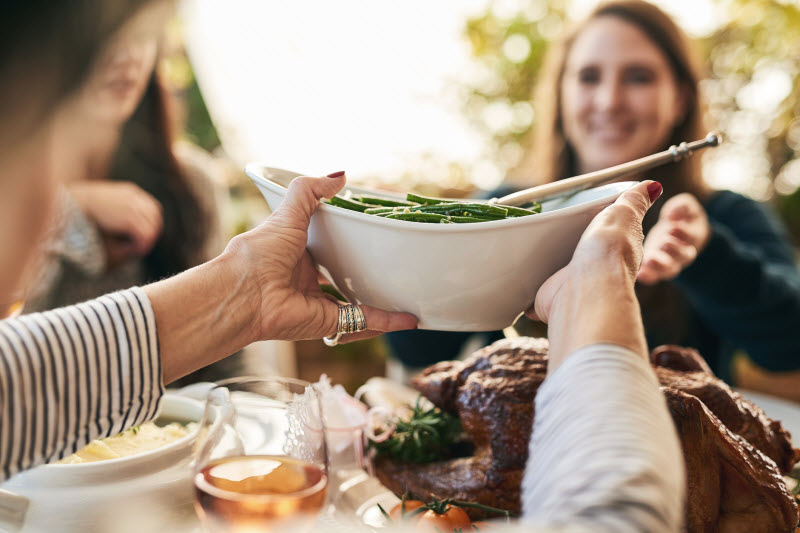[vc_row][vc_column][vc_column_text]The holidays are a time to gather with family and friends. That usually means big meals and a lot of snacking.
If you have
diabetes, however, such festivities can put your health at risk.

"The holiday season can be such a happy time, but also a bit stressful for those with a chronic disease such as diabetes," says
Rita P. Smith, a registered dietitian and certified diabetes educator at Sentara Martha Jefferson Hospital in Charlottesville, Virginia.
People without diabetes typically can handle the food indulgences that come with the holidays. When they eat, the body converts carbohydrates into glucose, a sugar that is absorbed into the bloodstream.
The hormone insulin then helps the glucose travel to the cells in the body, where it is used for energy.
However, folks with diabetes have issues with insulin. Type 1 diabetes causes the body to stop making insulin. Type 2 diabetes prevents the body from properly responding to the insulin the body makes.
How the holidays can harm those with diabetes
Over the long term, uncontrolled diabetes can result in grave harm to your health. You may experience nerve damage and vision problems. Some people suffer harm to their feet and limbs.
Untreated diabetes also has been linked to an increased risk of heart disease and stroke. Among people with diabetes, 2 out of 3 eventually die from cardiovascular disease, according to the Centers for Disease Control and Prevention.
Keeping blood glucose levels stable helps your body remain sensitive to insulin and can prevent the damage associated with diabetes. Eating properly and exercising regularly are two ways to promote stable blood glucose levels.
However, Smith notes that
during the holidays, eating and exercise schedules -- as well as the amounts and types of foods served -- are "out of kilter with normal routine."
The result can be "glucose levels run amuck," Smith says.
If your blood glucose levels get out of whack, you might experience symptoms such as:
- Fatigue
- Increased thirst and hunger
- Vomiting
- Frequent urination
- Blurred vision
"For some people, the glucose spikes are so high that a trip to the emergency room or doctor's office is needed," Smith says.
Safe holiday eating for those with diabetes
If you have diabetes, you can still enjoy the season. You simply must be a little more careful than other folks about what you eat.
One key to staying healthy is to try to stick to your normal eating schedule.
"Maintain a mealtime routine as much as possible, eating three meals at regular times," Smith says. Doing so can help keep your blood glucose steady throughout the day.
She also recommends moderate servings of starches during your meals. Such foods include:
- Potatoes
- Stuffing
- Pasta
- Rice
- Legumes
- Breads and rolls
- Fruits
Fiber-rich foods also should be part of your holiday menu plans. So, choose whole wheat bread or brown rice and quinoa stuffing instead of traditional white bread stuffing, Smith says.
Also consider small baked sweet potatoes instead of sweet potato and marshmallow casserole. Additional good alternatives include oven-roasted fall vegetables instead of green bean casserole, and baked apples instead of apple pie.
Other
tips diabetes experts generally recommend for safe eating during the holidays include:
- Keep portion sizes small
- Choose low-carb, high-protein and fiber-rich foods over high-fat, sugary foods
- Drink water instead of sweetened drinks
- Drink alcohol in moderation, as it may have a lot of carbohydrates
Other ways to stay on track
In addition to carefully planning your meals, Smith urges you to
remain active during the holidays.
Something as simple as a daily walk can help keep you moving, which contributes to stable blood glucose levels. If the holidays become too hectic, adjust your workout regimen.
"Break it up into smaller amounts more frequently," Smith says. "For example, rather than one 30-minute walk, take a 10-minute walk after breakfast, lunch and dinner."
The
CDC also recommends checking your blood glucose levels more often during the holiday season. If something seems amiss, ask your doctor about adjusting your diabetes medication during this time of the year.
Finally, don’t worry too much if you go overboard during a meal or at a party. Simply wake up the next day and get back on track.
[/vc_column_text][/vc_column][/vc_row][vc_row][vc_column][vc_text_separator title="Featured Products" border_width="2"][vc_row_inner equal_height="yes" content_placement="middle" gap="35"][vc_column_inner width="1/3"][vc_single_image image="163524" img_size="full" alignment="center" onclick="custom_link" img_link_target="_blank" css=".vc_custom_1668870021025{padding-right: 7% !important;padding-left: 7% !important;}" link="https://www.vitacost.com/bio-nutrition-blood-sugar-wellness-60-vegetarian-capsules"][/vc_column_inner][vc_column_inner width="1/3"][vc_single_image image="163522" img_size="full" alignment="center" onclick="custom_link" img_link_target="_blank" css=".vc_custom_1668870036066{padding-right: 7% !important;padding-left: 7% !important;}" link="https://www.vitacost.com/nature-made-diabetes-health-pack-30-packs-1"][/vc_column_inner][vc_column_inner width="1/3"][vc_single_image image="163523" img_size="full" alignment="center" onclick="custom_link" img_link_target="_blank" css=".vc_custom_1668870052834{padding-right: 7% !important;padding-left: 7% !important;}" link="https://www.vitacost.com/zahler-diabetter-advanced-glucose-support"][/vc_column_inner][/vc_row_inner][/vc_column][/vc_row]
 "The holiday season can be such a happy time, but also a bit stressful for those with a chronic disease such as diabetes," says Rita P. Smith, a registered dietitian and certified diabetes educator at Sentara Martha Jefferson Hospital in Charlottesville, Virginia.
People without diabetes typically can handle the food indulgences that come with the holidays. When they eat, the body converts carbohydrates into glucose, a sugar that is absorbed into the bloodstream.
The hormone insulin then helps the glucose travel to the cells in the body, where it is used for energy.
However, folks with diabetes have issues with insulin. Type 1 diabetes causes the body to stop making insulin. Type 2 diabetes prevents the body from properly responding to the insulin the body makes.
"The holiday season can be such a happy time, but also a bit stressful for those with a chronic disease such as diabetes," says Rita P. Smith, a registered dietitian and certified diabetes educator at Sentara Martha Jefferson Hospital in Charlottesville, Virginia.
People without diabetes typically can handle the food indulgences that come with the holidays. When they eat, the body converts carbohydrates into glucose, a sugar that is absorbed into the bloodstream.
The hormone insulin then helps the glucose travel to the cells in the body, where it is used for energy.
However, folks with diabetes have issues with insulin. Type 1 diabetes causes the body to stop making insulin. Type 2 diabetes prevents the body from properly responding to the insulin the body makes.




